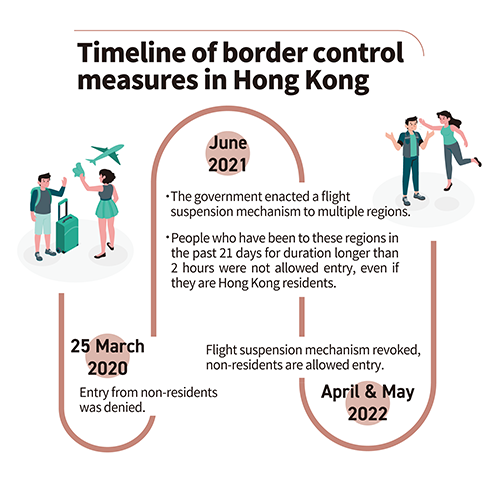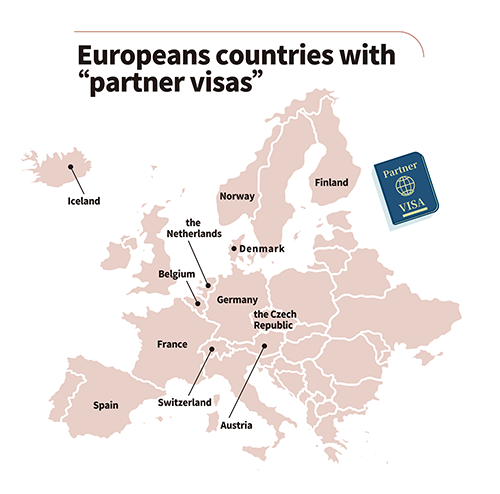Transnational families and couples separated under the pandemic
Love knows no boundaries. The pandemic, however, made the boundaries between regions so prominent.
Lock-downs separating loved ones
In the beginning of 2020, COVID-19 spread across the globe. On 30 Jan 2020, the World Health Organization announced the virus as one of the "Public Health Emergency of International Concern". On 11 March the same year, it pronounced the situation a pandemic. After three years of pandemic, over 600 million people are infected, causing over 6.5 million deaths.
At the beginning of the pandemic, the infectability and mortality of the virus were very high, and the medical sector had very limited knowledge of the disease. To prevent the virus from spreading, governments around the globe implemented unprecedented border control measures. Suddenly, the busy international travel paths all laid dormant. A lot of countries carried out border control based on "nationalities", only allowing entry of their own citizens. Some distinguish by “travel history”, denying entry from people who have been to "high risk areas" previously. The government, business sector, and general public were concerned with the efficacy of travel ban, or they were worried about its impact to the economy, financial activities, employment, and travelling. As the virus spread, the travel ban caused millions of transnational families and couples to be in long term separation. Their needs were overlooked by the world.
Take Hong Kong as an example, the government has taken harsh border control measures under the pandemic. From 25 March 2020, the government has banned non-residents from entering the region, essentially denying access for all foreign travellers to Hong Kong. In June 2021, the measures were further tightened. Flight suspension mechanism was issued on Australia, Canada, France, India, Nepal, Pakistan, the Philippines, the UK, and the US. People who have been to these regions in the past 21 days for duration longer than 2 hours cannot enter, even if they are Hong Kong residents. In April and May 2022, the government lifted the flight suspension mechanism and relaxed the entry of non-residents respectively. It took more than two years for the government to fully allow non-residents entry to Hong Kong, in which they need to fulfil vaccination and RAT requirements.
This means transnational couples and families forced to separate due to their lack of marriage certificates or resident permit. For unmarried couples, parents were prevented from seeing their children. Families spread across regions were unable to meet in real life because of these border control measures, they were not allowed to stay with their loved ones who are sick, or even see them for the very last time.

The 'Love is Not Tourism' Movement
Transnational families and couples could only listen to each other's voices and see each other’s faces through the screen, but were not able to give each other a long-sought hug. They were missing festivities, their children growing up and many important moments in their lives. During the pandemic, they could only endure worry, anxiety, helplessness, and yearning alone.
As time passed, they experienced the ups and downs of the pandemic in different places. The return to normal seems impossibly far, these transnational families and couples can only wish that governments give leeway for them to reunite. The 'LoveIsNotTourism' Movement was started online, hoping that their voices are heard.
The movement spread rapidly across different social media platforms, gathering voices from different corners of the world, more and more transnational families and couples came out and spoke. They started petitions online, held press conferences, raised their demands and appeal to governments to respond. They pointed out that the border control measures have an overly narrow definition of "family". In the modern era, families can look all sorts of ways, relationships are the true building blocks of a family. Governments should respect the basic human rights and needs of these transnational families and couples, providing them with leeway in processing their immigration needs. The movement started in Europe, and then spread to regions like Taiwan, South Korea, Japan, Malaysia, and the Philippines, where people started petitions demanding the governments to loosen border control.
"Corsi Crumpler from Texas, the US, and Sean Donovan from Dublin, Ireland, were transnational couple. Crumpler found out she was pregnant in November 2019, then the pandemic broke out. She last saw Donovan in March 2020. Their baby came to the world in July 2020. Crumpler endured a harrowing 24-hour labor, giving birth without her fiancé. Donovan also missed out the opportunity to hug his new born baby with his wife." – Business Insider
"Alix Indigo Holmgaard, a Denmark citizen, hadn't seen her fiancé and stepdaughter in the UK for more than a year. Their family was in Denmark but they were torn apart because the pandemic. Her fiancé and stepdaughter stayed in the UK while Holmgaard lived in Denmark with her three children." - CNN
"Ms. Tsai's father passed away in Janurary this year. Ms. Tsai, currently based in the UK, wished to enter Hong Kong as soon as possible to take care of her father's funeral arrangements. Unfortunately, the government denies entry of people who have been in the UK in the last 21 days. Ms. Tsai tried seeking help from relevant authorities, hoping to receive special arrangement, but she never got a direct response. Ms. Tsai never got to attend her father's funeral in Hong Kong." – Facebook Group 'Hong Kong Support Group'

"Partner visas" allowing loved ones to reunite
From July 2020, a number of European countries, including Belgium, Denmark, the Netherlands, the Czech Republic, Iceland, Austria, Switzerland, Germany, France, and Spain responded to their demands, and started accepting entry via partner visa. These governments asked for proof from applicants, such as photographs, chat history, and boarding pass, showing at least three months of established relationship prior to their application. Immigration also required travellers to adhere to strict quarantine measure, such as requiring nucleic acid testing results within the last 72 hours, and quarantine for 14 days.
The partner visa is also named "sweetheart visa", it is a source of hope for many transnational families and couples, giving them a chance to finally reunite, to embrace each other again. However, not all transnational families and couples are so fortunate. Not all governments respond to their demand for loosening up border control. Some transnational families and couples can only continue to endure endless wait and longing, hoping for the world to return to normal. As days passed, the pandemic eased, plus an increasing vaccination rate, some countries started to allow entry from foreigners in the summer of 2021. Others waited until 2022 to loosen up border control.
More transnational families created under globalisation
The separation these transnational families and couples experienced are unique. Their experiences represent an aspect of life in the globalised world. The movement of people created by globalisation has changed how families look like. Family members no longer reside in the same place, they may hold different nationalities, or even from different races. Each member moves to different countries for work and life, the movement of people made transnational relationships more and more common. To these families, travelling to meet each other every week, month, or every few months, is part of how they build and maintain family relationships.
If not for the pandemic, they likely would never have had to be separated for so long so helplessly. Social anthropologists have said that even though the pandemic has brought loss and difficulties for everyone, transnational families and couples have to face and endure much more. Suddenly, members of these families and couples are faced with the impossibility of physically being with their loved ones, this prolonged separation causes severe impact to their mental health. They may feel discriminated, misunderstood, feel that the current situation is unfamiliar, unsafe, and lose the sense of belonging.
Balancing the need between disease control and families
Foreign students, foreign domestic workers, even foreigners can apply for student visas and work visas, but transnational families and couples do not have any legal ways to cross the border. Is this arrangement appropriate? Dating is the essential step towards marriage, transnational relationships are built on love. Even though they may not join their hands in marriage, their need to be united should not be neglected. Moreover, in the modern era, a lot of people do not view marriage as a must. Many unmarried couples rear children and start a family. Other than their marital status, there are no difference between them and a normal family.
According to Article 10 of the "International Covenant on Economic, Social and Cultural Rights" from the UN, "The widest possible protection and assistance should be accorded to the family, which is the natural and fundamental group unit of society, particularly for its establishment and while it is responsible for the care and education of dependent children." Article 10 of The UN's "Convention on the Rights of the Child" states that "if a child lives in a different country than their parents, governments must let the child and parents travel so that they can stay in contact and be together." Governments are responsible for protecting its people and their relationships with their children. To strictly cut off the families' reunion with their strict border control policies neglects their and their children's needs, causing unnecessary harm.
A once-in-a-millennium pandemic toppled our regular life. How to achieve balance between disease control and protection, and human rights and emotional needs, is the true challenge for governments and healthcare professionals.
References
- Bachelor, B. (2021, May 5). The desperate families still torn apart by Covid rules. CNN. https://edition.cnn.com/travel/article/families-torn-apart-covid-rules/index.html
- Ferazzoli, M. T., & Walsh, J. (2021, November 22). COVID travel restrictions have created new borders for migrants who want to visit home. The Conversation UK. https://theconversation.com/covid-travel-restrictions-have-created-new-borders-for-migrants-who-want-to-visit-home-171461
- Halpert, J. (2020, Jul 30). Unmarried 'sweethearts' separated by borders are turning to social media campaigns and petitions to reduce travel bans preventing couples from reuniting. Business Insider. https://www.businessinsider.com/unmarried-couples-separated-borders-social-media-petitions-fight-travel-bans-2020-7
- Hong Kong Support Group (2022, January 10). Sorry but I just have to vent. Frustrated about this cold-blooded government. [Online post]. Facebook. https://www.facebook.com/groups/2788738214495345/permalink/4776771879025292/
- loveisnottourism_taiwan [@loveisnottourism_tw]. (2020, August 12). 故事二十二 [Photograph]. Instagram. https://www.instagram.com/p/CDyY7OMHN-6/?utm_source=ig_web_copy_link
- Nehring, D., & Hu, Y. (2022). COVID-19, Nation-States and Fragile Transnationalism. Sociology, 56(1), 183–190. https://doi.org/10.1177/00380385211033729
- Skovgaard-Smith, I. (2021). Transnational life and cross-border immobility in pandemic times. Global Networks, 1– 16. https://doi.org/10.1111/glob.12350
- UNICEF. (2022). The Convention on the Rights of the Child: The children’s version. https://www.unicef.org/child-rights-convention/convention-text-childrens-version
- World Health Organization. (2022). WHO Coronavirus (COVID-19) Dashboard. https://covid19.who.int
- 香港特別行政區政府 (2020年)。2020年3月23日新聞公報-政府宣布四方面加強防疫抗疫措施。https://www.info.gov.hk/gia/general/202003/23/P2020032300765.htm
- 曾彥菁(2020年11月10日)。愛在瘟疫蔓延時!歐洲13國發「戀愛簽證」允跨國情侶入境 台灣近3000人連署。天下雜誌。https://futurecity.cw.com.tw/article/1756
- 香港特別行政區政府 (2021年)。2021年6月28日新聞公報- 政府就英國實施地區性航班「熔斷機制」 禁止當地客機來港。https://www.info.gov.hk/gia/general/202106/28/P2021062800821.htm
- 香港特別行政區政府 (2022年)。2022年3月26日新聞公報-政府按風險調整海外抵港人士的登機、檢疫及檢測安排。https://www.info.gov.hk/gia/general/202203/26/P2022032600717.htm
- 聯合國(2022年)。經濟、社會與文化權利的國際公約。https://www.un.org/zh/documents/treaty/A-RES-2200-XXI








